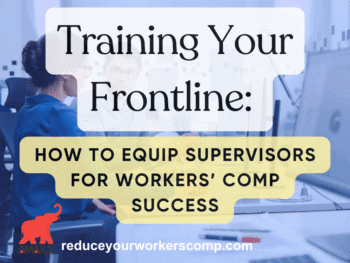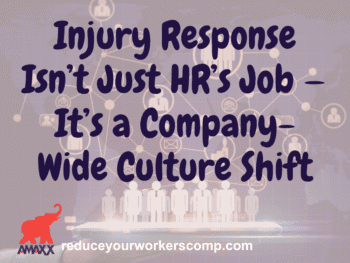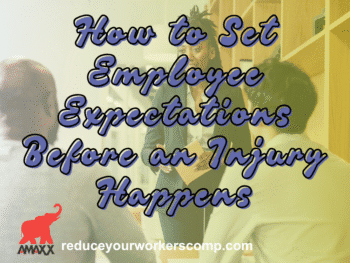
Attorney involvement is a huge cost driver, often more than doubling the cost of a claim. It makes sense to do everything possible to eliminate this reason a worker would contact an attorney — especially when it is as simple as making a phone call.
Why It’s Important
A worker who has been injured is suddenly thrust completely outside his comfort zone. His employer can easily allay his fears and concerns by contacting him. Calling the injured worker as soon as possible after the injury sets the tone for the claim.
Who Should Call
The most effective way to set a positive tone for the claim is by having a trusted colleague connect with the injured worker. In most cases, it is the supervisor. That person typically knows the injured worker well and is also in the best position to provide information about the company’s disability management process.
In some cases the supervisor may not be the best person to contact the injured worker; he may be unavailable or may have a frictional relationship with the employee. In those cases, someone else should be designated to communicate with the worker. It could be another manager who has a positive relationship with the employee or even a coworker who clearly understands the workers’ compensation process.
What to Say
A big reason some supervisors don’t contact injured workers is because they are not sure what to say. The conversation can be simple and friendly. With some basic, short training, the first-day phone call can be the most important aspect of handling the claim.
It’s important to understand the most immediate concerns of an injured worker are:
- How and when he will get paid
- How he will receive medical treatment
- Whether and how he will be able to work
The conversation should address those issues, and answer any additional questions the worker has. The tone of the discussion should be friendly and easy, expressing concern and understanding. It is also imperative that the caller convey the message that the company wants the employee back at work.
Here are examples of things to say to the injured worker:
Show caring and concern:
- How are you? How is it going?
- How are you feeling?
- How was your first medical appointment?
- Did you like the doctor?
- Are/were you able to get the prescriptions you need?
Express support and understanding:
- We are really sorry you got injured.
- Is there anything we can do to help?
- Would you like me to contact your family?
- Do you need me to pick up any of your clothes, your materials, anything from the office?
- We want you back at work.
In addition to asking questions, the caller should actively listen to what the injured worker is saying. That means letting him speak without interrupting him, even if he is angry and upset. What is important is that he is heard and that the caller expresses his understanding of the situation — even if the caller does not agree with what the worker is saying.
Conclusion
Workers’ compensation claims close quicker when the injured worker heals faster and gets back to work sooner. Engaging the worker in his recovery will expedite the process. Injured workers who feel their employer cares about their well-being and maintains a connection are more engaged than those who feel alienated.

Contact: mstack@reduceyourworkerscomp.com.
Workers’ Comp Roundup Blog: https://blog.reduceyourworkerscomp.com/
©2018 Amaxx LLC. All rights reserved under International Copyright Law.
Do not use this information without independent verification. All state laws vary. You should consult with your insurance broker, attorney, or qualified professional.



























